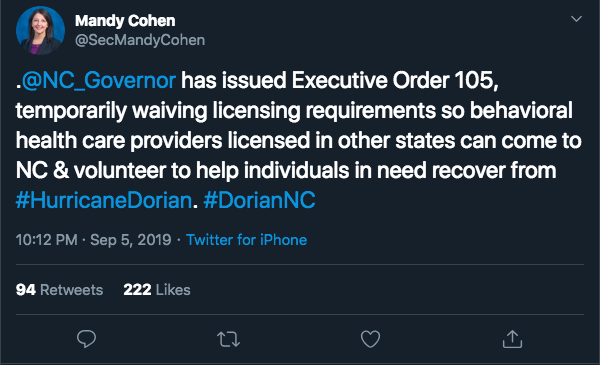Medical licensing is in place to help prevent patients from being treated by someone with no training or by someone who has had ethical violations in the past. However, in many circumstances, states have gone too far in the amount of medical licensing medical professionals must obtain to practice in the state.
As it currently stands, in most cases, you would have to obtain a medical license in each state which you would like to practice. This is usually an expensive and tedious process. But let me pose this question: if a physician is licensed in North Carolina, should they have to get a South Carolina license to treat South Carolina patients who could be only a few miles away from across the border?
This is a core question when we think about the primary care shortage that North Carolina is facing and that the country will face in the future. Artifical licensure barriers may be affecting the number of physciains a patient could see. Further, now that telemedicine is connecting patients to doctors all over the country, it’s worth weighing the costs and benefits of medical licensure laws.
Consider this story from CNBC about a doctor who has received licenses in almost all 50 states to practice telemedicine and see as many patients as possible:
Blake McKinney is a doctor with medical licenses in 49 states and a 50th likely on the way. That would put him into a small but growing group of physicians who see a big future online…
…Telemedicine start-ups can either hire a lot of doctors with one or two licenses or retain a smaller team of people who can work across many states. McKinney’s company CirrusMD, a chat-first virtual primary care provider, chose the latter approach, as did virtual care start-up Lemonaid, which is based in San Francisco and has three doctors on staff, each with 50 licenses.
“Licensing physicians in multiple states is incredibly beneficial for patients,” said Zachariah Reitano, the CEO of Ro, an online pharmacy and telemedicine company that prescribes erectile dysfunction medication and hair loss treatments. “It enables a physician to treat patients in care deserts and increases access to care where there aren’t enough providers available.”
As the article goes on to state, telemedicine has the potential to connect doctors to patients and doctors to specialists around the country with the click of a button. But why should a doctor have to get a license in all 50 states to practice telemedicine? Does obtaining a license in your 2nd state make you a better doctor? 10th? 30th? 49th? As medical deserts continue to pose problems to local populations, telemedicine could continue to connect patients, as long as licensure barriers don’t get in the way.
This goes the same for health professionals who would like to see patients beyond the state in which they currently lie and practice. Consider this tweet from North Carolina Secretary of Health and Human Services, Mandy Cohen in the wake of Hurricane Dorian:

So we accept that during a hurricane, out of state medical professionals are well-trained enough to come into our state and treat patients, but in the absence of a hurricane, we would not trust their medical expertise?
This shows how medical licensure may hinder the freedom of physicians and patients. To help with the problems of primary care shortages in the country, perhaps lawmakers should look to liberalize licensure laws to allow doctors to treat patients and patients to access care in the way they most prefer.


